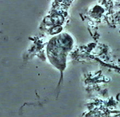Protist
Protists are a diverse group of eukaryotic microorganisms. Historically, protists were treated as the kingdom Protista, which includes mostly unicellular organisms that do not fit into the other kingdoms, but this group is contested in modern taxonomy. Protists live in almost any environment that contains liquid water. Many protists, such as algae, are photosynthetic and are vital primary producers in ecosystems, particularly in the ocean as part of the plankton. Others are saprophytes, or organisms that decompose dead organisms, and parasites, which harm their host.
Classification[edit]
Protists were traditionally subdivided into several groups based on similarities to the "higher" kingdoms such as:
- Protozoa, which includes amoebae, flagellates, ciliates, sporozoans, and many other forms of "animal-like" microbes.
- Algae, which are plant-like protists that can be unicellular or multicellular.
- Fungus-like protists, which include slime molds and water molds.
However, modern classifications attempt to assign protists into monophyletic groups, which are sets of organisms that includes all the descendants of a common ancestor.
Characteristics[edit]
Protists are a diverse group of organisms, with a wide range of characteristics. Some protists, like the amoeba, move by pseudopodia, while others, like paramecium, move by cilia. Some protists, like the euglena, have chloroplasts and can perform photosynthesis, while others, like the plasmodium, are parasitic and cause disease.
Reproduction[edit]
Protists reproduce by a variety of mechanisms. Most protists reproduce asexually under favorable conditions, but will sometimes reproduce sexually under stress. Some protists, like the amoeba, reproduce by binary fission, while others, like the paramecium, reproduce by conjugation.
Ecological role[edit]
Protists play a vital role in their ecosystems. Many protists, such as algae, are photosynthetic and are vital primary producers in ecosystems, particularly in the ocean as part of the plankton. Others are saprophytes, decomposing dead organisms and recycling their nutrients back into the ecosystem.
See also[edit]
|
|
|
Protist[edit]
-
Protist collage
-
Eukaryotic diversity morphological vs genetic
-
Giardia lamblia SEM
-
Trichomonas gingivalis
-
Trypanosoma cruzi
-
Euglena gracilis
-
Malawimonas
-
Zoospore release
-
Nitzschia kerguelensis
-
Giant kelp (Macrocystis pyrifera) holdfast
-
Cafeteria roenbergensis
-
Opalina ranarum
Ad. Transform your life with W8MD's Budget GLP-1 injections from $49.99


W8MD offers a medical weight loss program to lose weight in Philadelphia. Our physician-supervised medical weight loss provides:
- Weight loss injections in NYC (generic and brand names):
- Zepbound / Mounjaro, Wegovy / Ozempic, Saxenda
- Most insurances accepted or discounted self-pay rates. We will obtain insurance prior authorizations if needed.
- Generic GLP1 weight loss injections from $49.99 for the starting dose of Semaglutide and $65.00 for Tirzepatide.
- Also offer prescription weight loss medications including Phentermine, Qsymia, Diethylpropion, Contrave etc.
NYC weight loss doctor appointmentsNYC weight loss doctor appointments
Start your NYC weight loss journey today at our NYC medical weight loss and Philadelphia medical weight loss clinics.
- Call 718-946-5500 to lose weight in NYC or for medical weight loss in Philadelphia 215-676-2334.
- Tags:NYC medical weight loss, Philadelphia lose weight Zepbound NYC, Budget GLP1 weight loss injections, Wegovy Philadelphia, Wegovy NYC, Philadelphia medical weight loss, Brookly weight loss and Wegovy NYC
|
WikiMD's Wellness Encyclopedia |
| Let Food Be Thy Medicine Medicine Thy Food - Hippocrates |
Medical Disclaimer: WikiMD is not a substitute for professional medical advice. The information on WikiMD is provided as an information resource only, may be incorrect, outdated or misleading, and is not to be used or relied on for any diagnostic or treatment purposes. Please consult your health care provider before making any healthcare decisions or for guidance about a specific medical condition. WikiMD expressly disclaims responsibility, and shall have no liability, for any damages, loss, injury, or liability whatsoever suffered as a result of your reliance on the information contained in this site. By visiting this site you agree to the foregoing terms and conditions, which may from time to time be changed or supplemented by WikiMD. If you do not agree to the foregoing terms and conditions, you should not enter or use this site. See full disclaimer.
Credits:Most images are courtesy of Wikimedia commons, and templates, categories Wikipedia, licensed under CC BY SA or similar.
Translate this page: - East Asian
中文,
日本,
한국어,
South Asian
हिन्दी,
தமிழ்,
తెలుగు,
Urdu,
ಕನ್ನಡ,
Southeast Asian
Indonesian,
Vietnamese,
Thai,
မြန်မာဘာသာ,
বাংলা
European
español,
Deutsch,
français,
Greek,
português do Brasil,
polski,
română,
русский,
Nederlands,
norsk,
svenska,
suomi,
Italian
Middle Eastern & African
عربى,
Turkish,
Persian,
Hebrew,
Afrikaans,
isiZulu,
Kiswahili,
Other
Bulgarian,
Hungarian,
Czech,
Swedish,
മലയാളം,
मराठी,
ਪੰਜਾਬੀ,
ગુજરાતી,
Portuguese,
Ukrainian







